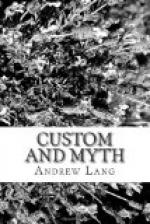These objections are not made by the unscholarly anthropologist alone. Curtius has especially remarked the difficulties which beset the ‘etymological operation’ in the case of proper names. ’Peculiarly dubious and perilous is mythological etymology. Are we to seek the sources of the divine names in aspects of nature, or in moral conceptions; in special Greek geographical conditions, or in natural circumstances which are everywhere the same: in dawn with her rays, or in clouds with their floods; are we to seek the origin of the names of heroes in things historical and human, or in physical phenomena?’ {3a} Professor Tiele, of Leyden, says much the same thing: ’The uncertainties are great, and there is a constant risk of taking mere jeux d’esprit for scientific results.’ {3b} Every name has, if we can discover or conjecture it, a meaning. That meaning—be it ‘large’ or ‘small,’ ‘loud’ or ‘bright,’ ‘wise’ or ‘dark,’ ‘swift’ or ’slow’—is always capable of being explained as an epithet of the sun, or of the cloud, or of both. Whatever, then, a name may signify, some scholars will find that it originally denoted the cloud, if they belong to one school, or the sun or dawn, if they belong to another faction. Obviously this process is a mere jeu d’esprit. This logic would be admitted in no other science, and, by similar arguments, any name whatever might be shown to be appropriate to a solar hero.
The scholarly method has now been applied for many years, and what are the results? The ideas attained by the method have been so popularised that they are actually made to enter into the education of children, and are published in primers and catechisms of mythology. But what has a discreet scholar to say to the whole business? ’The difficult task of interpreting mythical names has, so far, produced few certain results’—so writes Otto Schrader. {4} Though Schrader still has hopes of better things, it is admitted that the present results are highly disputable. In England, where one set of these results has become an article of faith, readers chiefly accept the opinions of a single etymological school, and thus escape the difficulty of making up their minds when scholars differ. But differ scholars do, so widely and so often, that scarcely any solid advantages have been gained in mythology from the philological method.
The method of philological mythology is thus discredited by the disputes of its adherents. The system may be called orthodox, but it is an orthodoxy which alters with every new scholar who enters the sacred enclosure. Even were there more harmony, the analysis of names could throw little light on myths. In stories the names may well be, and often demonstrably are, the latest, not the original, feature. Tales, at first told of ‘Somebody,’ get new names attached to them, and obtain a new local habitation, wherever they wander. ’One of the leading personages to be met in the traditions of the world




